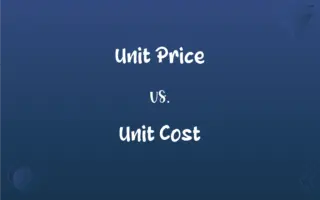Price vs. Value: What's the Difference?
Edited by Aimie Carlson || By Janet White || Published on January 20, 2024
Price is the amount of money required to purchase something. Value is the perceived worth or usefulness of something.

Key Differences
Price refers to the monetary cost of a product or service. Value is a broader concept that encompasses the utility, importance, or desirability of that product or service.
Price is quantifiable and often set by the seller or market. Value, on the other hand, is subjective and varies based on individual perception and circumstances.
The price of an item can be the same for everyone, but its value can differ widely among individuals based on their needs, preferences, and beliefs.
Price is a transactional figure, often influenced by production costs, competition, and market demand. Value incorporates personal or societal benefits and may include emotional, historical, or cultural significance.
Price is expressed in terms of money, while value is more complex, often considered in terms of utility, satisfaction, or personal significance.
ADVERTISEMENT
Comparison Chart
Definition
The monetary cost of a product or service
The perceived worth, utility, or importance of a product or service
Nature
Objective and quantifiable
Subjective and varies by individual
Measurement
Expressed in currency
Assessed in terms of personal or societal benefit
Influence Factors
Costs, market demand, competition
Individual needs, preferences, societal norms
Stability
Can fluctuate with market conditions
More stable, rooted in personal or cultural significance
ADVERTISEMENT
Price and Value Definitions
Price
The amount charged for a product or service.
The price of the laptop was $500.
Value
The importance or usefulness of something.
The value of a good education cannot be overstated.
Price
The cost at which something is offered for sale.
The price of a movie ticket has increased to $12.
Value
The perceived worth of an item or service.
He placed high value on handmade products.
Price
The sum of money required for a transaction.
The price of her new dress was surprisingly affordable.
Value
The qualitative measure of a product's desirability.
The historical value of the artifact was immense.
Price
The asking rate for a commodity in the market.
The price of organic vegetables tends to be higher than regular ones.
Value
The intrinsic worth as perceived by individuals or society.
For her, the sentimental value of the gift was priceless.
Price
Monetary value assigned to a good or service.
They compared the prices of phones across different stores.
Value
The utility or benefit derived from a good or service.
The value of the software lies in its user-friendliness.
Price
The amount as of money or goods, asked for or given in exchange for something else.
Value
An amount, as of goods, services, or money, considered to be a fair and suitable equivalent for something else; a fair price or return.
Price
The cost at which something is obtained
Believes that the price of success is hard work.
Value
Monetary or material worth
The fluctuating value of gold and silver.
FAQs
Can a high price indicate high value?
Not necessarily, as value is subjective and depends on personal perception.
What is price?
The monetary amount required to purchase a product or service.
How is price determined?
Price is influenced by production costs, competition, and market demand.
What is value?
The perceived worth, importance, or usefulness of something.
How do price and value differ?
Price is a set monetary amount, while value is subjective and varies per individual.
What is the relationship between price and quality?
Higher prices are often perceived as indicators of higher quality, but this is not always the case.
Can value change over time?
Yes, as individual perceptions and societal values evolve.
How do businesses set prices?
Based on costs, market research, and competitor pricing.
Does price affect a consumer’s perception of value?
It can, as consumers often associate price with quality.
Is the price always a reflection of value?
No, price and value can diverge based on various factors.
Can the value of an item be quantified?
While it can be estimated, value is largely subjective and personal.
What factors influence value?
Value is influenced by personal needs, preferences, and societal norms.
Why might the same product have different prices?
Due to location, seller, market conditions, or additional services.
How does cultural significance affect value?
Cultural significance can greatly enhance the value of an item beyond its price.
Why do people pay more for branded products?
Branding can increase perceived value due to reputation, quality, or status.
How do supply and demand affect price?
Higher demand and lower supply typically increase prices, and vice versa.
Is the economic value of a product the same as its price?
Not always, as economic value also considers utility and alternative uses.
What determines the value of a service?
Its perceived effectiveness, usefulness, or satisfaction provided.
Can sentimental value outweigh monetary price?
Yes, especially in items with personal or emotional significance.
Can a low-priced item have high value?
Yes, if it holds significant personal or practical importance.
About Author
Written by
Janet WhiteJanet White has been an esteemed writer and blogger for Difference Wiki. Holding a Master's degree in Science and Medical Journalism from the prestigious Boston University, she has consistently demonstrated her expertise and passion for her field. When she's not immersed in her work, Janet relishes her time exercising, delving into a good book, and cherishing moments with friends and family.
Edited by
Aimie CarlsonAimie Carlson, holding a master's degree in English literature, is a fervent English language enthusiast. She lends her writing talents to Difference Wiki, a prominent website that specializes in comparisons, offering readers insightful analyses that both captivate and inform.






































































